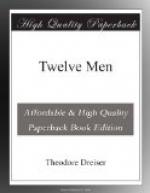My brother came away smiling and content.
However, it is not as a humorist or song-writer or publisher that I wish to portray him, but as an odd, lovable personality, possessed of so many interesting and peculiar and almost indescribable traits. Of all characters in fiction he perhaps most suggests Jack Falstaff, with his love of women, his bravado and bluster and his innate good nature and sympathy. Sympathy was really his outstanding characteristic, even more than humor, although the latter was always present. One might recite a thousand incidents of his generosity and out-of-hand charity, which contained no least thought of return or reward. I recall that once there was a boy who had been reared in one of the towns in which we had once lived who had never had a chance in his youth, educationally or in any other way, and, having turned out “bad” and sunk to the level of a bank robber, had been detected in connection with three other men in the act of robbing a bank, the watchman of which was subsequently killed in the melee and escape. Of all four criminals only this one had been caught. Somewhere in prison he had heard sung one of my brother’s sentimental ballads, “The Convict and the Bird,” and recollecting that he had known Paul wrote him, setting forth his life history and that now he had no money or friends.
At once my good brother was alive to the pathos of it. He showed the letter to me and wanted to know what could be done. I suggested a lawyer, of course, one of those brilliant legal friends of his—always he had enthusiastic admirers in all walks—who might take the case for little or nothing. There was the leader of Tammany Hall, Richard Croker, who could be reached, he being a friend of Paul’s. There was the Governor himself to whom a plain recitation of the boy’s unfortunate life might be addressed, and with some hope of profit.
All of these things he did, and more. He went to the prison (Sing Sing), saw the warden and told him the story of the boy’s life, then went to the boy, or man, himself and gave him some money. He was introduced to the Governor through influential friends and permitted to tell the tale. There was much delay, a reprieve, a commutation of the death penalty to life imprisonment—the best that could be done. But he was so grateful for that, so pleased. You would have thought at the time that it was his own life that had been spared.




